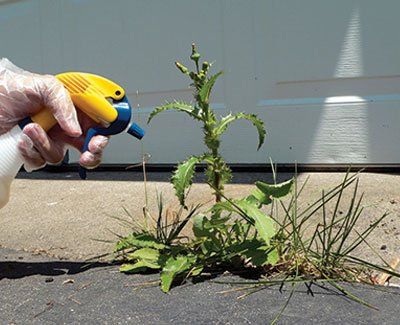Blog Layout
Make your own Weed Killer
Sep 16, 2019
Homemade Weed Control
Tuesday, June 10, 2014
There are a number of homemade remedies for weed control, but most are non-selective, which means it will also kill or cause leaf die-back on nearby desirable plants, so use carefully.
Boiling Water – This is an extremely effective weed killer as it cooks the plant in the ground. Boil water and immediately pour over unwanted weeds, being careful not to burn yourself in the process. This is a great way to clear out vegetation on driveways and sidewalks, but it is not selective and will cook and kill any nearby plants or roots that come in contact with the boiling water.
Bleach – Another effective weed killer. Pour some bleach in a spray bottle and spray on the undesirable weed to kill it. The bleach chemicals will evaporate or dissipate in about two days making the area safe for planting. Bleach is also non-selective but can be immediately washed off (with water) of any desirable plants.
Vinegar – Either white or cider vinegar are great organic homemade weed killers. The acetic acid in the vinegar works to kill the leaves on the plant over a few days but not the root. Using vinegar on younger weeds will kill it quicker since the younger roots do not have enough reserves to regrow leaves. On more established weeds, use vinegar repeatedly and eventually the roots will deplete its stored energy reserves and die.
Salt – This will kill plants but it will also make the surrounding soil unsuitable for future planting. Salting enemy fields was a war tactic or used as severe punishment throughout history. To kill selective weeds, drop a small pinch of table salt at the base of the undesirable plant. The plant will die and the salt will dilute to harmless after a few rainfalls. On a larger scale, cover a gravel driveway with a good amount of salt and nothing will grow there for months. However, some salt will run-off and kill plants beside the driveway and will probably contaminate the ground water, so don't over use this method.
Rubbing Alcohol – When rubbing alcohol is sprayed onto a plant, it draws the water out of the plant, causing it to die. However, it is non-selective and will kill any vegetation it contacts.
Corn Meal – This is not a weed killer but it does stop the weed seeds from germinating. Corn meal spread over an area will keep any seed (weed or desirable) from growing into a plant but does not kill existing weeds. Do not use on a newly grass-seeded area.
Newspaper – Another option is to smother the weeds with layers of newspapers. Lay down a layer of at least 4 sheets of newspaper (more is better), wet it down and put some mulch or soil on top to stop it from drying out and blowing all over. The weeds under the newspaper will die from lack of sun and the newspaper will slowly break-down into the soil. This is a useful method for starting a new garden bed.
Many of these weed killers can be combined to produce better results. For example, boiling water can be mixed with salt or vinegar (or both) for a super weed killer. Use common sense when combining chemicals and make sure that there are no adverse reactions. Do not combine bleach with any other chemical as it may produce toxic fumes. Always test the weed killer on a small area of weeds to determine its effectiveness.
Add a few drops of liquid dish soap to liquid homemade weed killers for added effectiveness. The soap is not harmful to plants but helps the weed killer stick to the plant and stay on longer.
Since most of these homemade weed remedies will kill all plants, cover or shield desirable plants to prevent sprays and splashes from damaging them.
This information was found on the website http://www.thisgardenisillegal.com
We are proud members of the following organizations:

905-599-2907
Markdale, ON, N0C 1H0
Markdale, ON, N0C 1H0
View our Privacy Policy.
Website design by ColourPix.
© 2024
Ladybird Garden Designs





